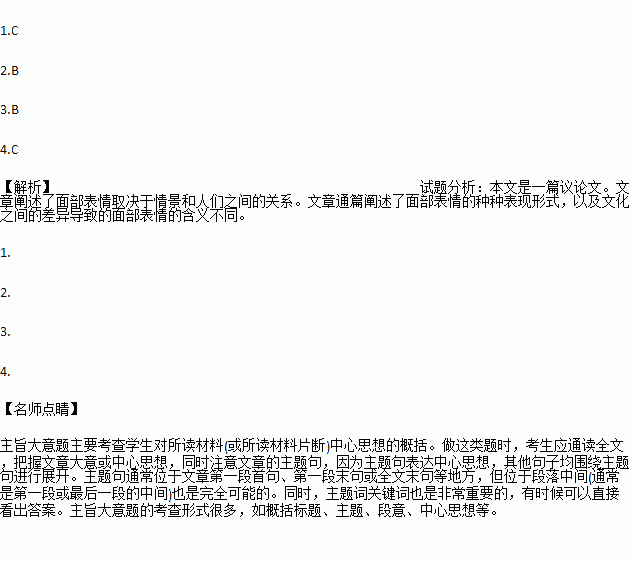题目内容
Facial expressions carry meaning that is determined by situations and relationships. For example, in American culture (文化) the smile is in general an expression of pleasure. Yet it also has other uses. A woman’s smile at a police officer does not carry the same meaning as the smile she gives to a young child. A smile may show love or politeness. It can also hide true feelings. It often causes confusion (困惑) across cultures. For example, many people in Russia consider smiling at strangers in public to be unusual and even improper. Yet many Americans smile freely at strangers in public places (although this is less common in big cities).Some Russians believe that Americans smile in the wrong places; some Americans believe that Russians don’t smile enough. In Southeast Asian cultures, a smile is frequently used to cover painful feelings. Vietnamese people may tell a sad story but end the story with a smile.
Our faces show emotions (情感), but we should not attempt to "read" people from another culture as we would "read" someone from our own culture. The fact that members of one culture do not express their emotions as openly as do members of another does not mean that they do not experience emotions.
Rather, there are cultural differences in the amount of facial expressions permitted. For example, in public and in formal situations many Japanese do not show their emotions as freely as Americans do. When with friends, Japanese and Americans seem to show their emotions similarly.
It is difficult to generalize about Americans and facial expressiveness because of personal and cultural differences in the United States. People from certain cultural backgrounds in the United States seem to be more facially expressive than others. The key is to try not to judge people whose ways of showing emotion are different. If we judge according to our own cultural habits, we may make the mistake of "reading" the other person incorrectly.
1.What does the smile usually mean in America?
A. Love. B. Politeness.
C. Joy. D. Thankfulness.
2.The author mentions the smile of the Vietnamese to prove that smile can ___ .
A. show friendliness to strangers
B. be used to hide true feelings
C. be used in the wrong places
D. show personal habits
3.What should we do before attempting(尝试) to "read" people?
A. Learn about their relations with others.
B. Understand their cultural backgrounds.
C. Find out about their past experience.
D. Figure out what they will do next.
4.What would be the best title for the test?
A. Cultural Differences
B. Smiles and Relationship
C. Facial Expressiveness
D. Habits and Emotions
 阅读快车系列答案
阅读快车系列答案人们对中学生在网上交友持有不同的意见。请你用英语写一篇关于学生在网上交友的短文,介绍人们的不同观点并表达自己的观点。
赞成的理由 | 反对的理由 | 你的观点 |
广交朋友 可以自由地表达自己的观点 有利于外语学习 | 浪费时间 影响学习 可能上当受骗 | ….. |
注意:1. 文章必须包含表中的全部内容
2. 词数100左右,开头已给出,不计入总词数
参考词汇:上当受骗 get cheated
Should students make friends online? Different people have different opinions.
__________________________________________________________________________________________________________________________________________________________________________________________________________________________________________________________________________________________________________________________________________________________________________________________________________________________________________________________________________________________________________________

